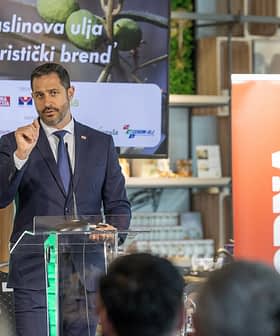Tourism has always been big business for Greece. People flock here for its gorgeous beaches, the history and the hospitable locals. But what about the food? That was the question that the 7th International Meetings & Incentives Conference, Valuing the Food Experience in Athens was on a quest to answer. The conference organized by Heliotopos, aimed to raise awareness and understanding about the growing importance of the food experience in tourism. The conference comes at an especially critical time as food tourism is gaining momentum in Greece and elsewhere. Tourism experts, journalists, and chefs from around the world gathered to present and discuss the importance of food
and gastronomy in the tourism sector.
 The conference started off with a presentation by Mr. Nicolas Kanellopoulos, president of the Greek National Tourism Organization. In his presentation Kanellopoulos stressed the importance of food as a factor in selecting a destination, but he added that Greek gastronomy is not one of the criteria that visitors have in mind when visiting Greece. However, he was optimistic about the future of the promotion of Greek food culture and pointed out that the indisputable advantage of the Mediterranean diet provides Greeks with the opportunity to showcase it as part of their touristic identity.
The conference started off with a presentation by Mr. Nicolas Kanellopoulos, president of the Greek National Tourism Organization. In his presentation Kanellopoulos stressed the importance of food as a factor in selecting a destination, but he added that Greek gastronomy is not one of the criteria that visitors have in mind when visiting Greece. However, he was optimistic about the future of the promotion of Greek food culture and pointed out that the indisputable advantage of the Mediterranean diet provides Greeks with the opportunity to showcase it as part of their touristic identity.
Kanellopoulos mentioned several initiatives such as development of olive and wine touristic routes around Greece, promotion of local products in hotels and an official categorization of restaurants that offer traditional Greek cuisine using traditional recipes and traditional ingredients. In closing, Kanellopoulos presented the two main goals of the Greek National Tourism Organization. “Our goal is to improve the quality of the food served in Greek hotels and restaurants using evaluative criteria and the adoption of the Greek breakfast,” he said.
Dr. Antonia Trichopoulou, professor and director of the World Health Organization Collaborating Centre for Nutrition at the Department of Hygiene and Epidemiology, School of Medicine, University of Athens, confirmed the value of the Greek-Mediterranean diet in her presentation stating that olive oil is the focal point of the diet and that studies have shown that the Mediterranean diet is not only beneficial for health but also for the environment. However, she expressed her concerns about integrity in the promotion of Greek food products. She explained that many food products are called traditional when in fact they are not. “Because of this, the concept of traditional is destroyed and no longer has any value,” she said. For that reason she explained there should be certain criteria and regulations in regards to defining traditional products.
A common theme in all discussions was the disconnect between the food experience of a tourist and “real” Greek cuisine. While Greeks in the tourism business are aware of the value of the Greek-Mediterranean diet, somehow this knowledge and tradition is not transferred to tourists visiting Greece.
The identity of Greek food is in question and to experience the “Greekness” of Greek food is elusive for the average tourist as food writer Albert Arouh explains in his presentation. Tourists visit Greece with a preconceived idea of what Greek food is, due to the fact that most Greek restaurants outside of Greece serve “typical” Greek dishes, which are not in fact so typical in Greece. Unfortunately when in Greece, these tourists are served these same cliché dishes because hoteliers and restaurateurs want to fulfill the expectations of their foreign customers. The importance of regional cuisine was also presented, with representatives from the islands of Crete, Aegina and Santorini as well as lesser-known islands such as Ikaria, Samos and Kea discussing the potential and promotion of the cuisine in these areas for Greek tourism.
The importance of regional cuisine was also presented, with representatives from the islands of Crete, Aegina and Santorini as well as lesser-known islands such as Ikaria, Samos and Kea discussing the potential and promotion of the cuisine in these areas for Greek tourism.
Until recently, food and gastronomy did not appear to be on the top of the list of priorities for the Greek tourism industry, however today it is on everyone’s mind. In the past week several conferences and sessions in Greece have been organized focusing on Greek food, including the establishment of the Greek breakfast, Greek gastronomy, and discussion of the recognition of the Mediterranean diet by UNESCO.
The event highlighted the potential Greece has to become a major food destination, however this can only happen if the tourism industry can resist the old clichés and work together to embrace Greece’s legendary culinary traditions and authentic regional cuisines.
The conference was organized by Helioptopos, a company that provides international conferences, destination management services and special interest tours throughout Greece and under the auspices the Greek Ministry of Culture and Tourism, the City of Athens, the Hellenic Foreign Trade Board, the Municipality of Thessaloniki, Hellenic Chamber of Hotels and the Association of Greek Tourism Enterprises.








